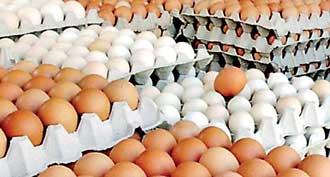06 Aug 2024 - {{hitsCtrl.values.hits}}
By Nuzla Rizkiya
 The move to resume imports sparked strong criticism from the local producers, who argued that the country is self-sufficient to fully cater to the local demand for eggs, even during the festive seasons, albeit at a higher price than what the government has offered.
The move to resume imports sparked strong criticism from the local producers, who argued that the country is self-sufficient to fully cater to the local demand for eggs, even during the festive seasons, albeit at a higher price than what the government has offered.
The government last week announced plans to resume importing eggs, citing the need to stabilise the prices and ensure the supply before the Christmas celebrations and Ramadan this December and February next year.
Speaking to Mirror Business, All Island Poultry Association President Mathalee Jayasekera stressed that the local producers are unable to offer eggs at a lower price, owing to the high costs incurred in local egg production, mainly through government policy impositions.
Currently, our prices range between Rs.40-42 but we know that in certain areas, it could go for Rs.50,” Jayasekera said.
According to him, the higher production costs were further fuelled by the low domestic yield of maize recorded for the year, where estimations were for 400,000 MT but resulted in 150,000 MT. The local egg production industry requires at least 700,000 MT of maize per year to fulfil its poultry feed supplies, according to Jayasekera.
He further claimed that the government permits to import maize and soybean on an open account basis, which were only offered to the large-scale poultry feed producers, who continue to sell their collections at high prices.
“The small-scale farmers still end up purchasing maize for Rs.180 per kilo from these large-scale importers, who charge the higher prices because of the taxes and levies they pay when importing. That’s a reason for the difference in the prices across regions.
But we should note that the supply doesn’t depend solely on these large-scale farms or poultry feed producers. There are plenty of small-scale farmers, who rely on natural feed and who are capable of contributing to the supply chain at a reasonable price,” he said.
The Sri Lanka Association of Animal Production (SLAAP) reflected similar sentiments and criticised the administration, stating that they are trying to leverage voter preferences for the upcoming elections.
“Every farm in the country is currently operating at full capacity and we can guarantee that the required stocks will be available in Sri Lanka for all the seasons. There is no reason to continue importing eggs,” SLAAP President Ajith Gunasekara said.
Since the government has already spent Rs.5600 million for the 244 million imported eggs, he cautioned that continuing on this path would result in the local industry to collapse.
He went on to urge the authorities, relevant ministries and industry stakeholders to come to a common agreement on the price that would ensure support for both the consumers and local producers.
26 Nov 2024 3 minute ago
26 Nov 2024 20 minute ago
26 Nov 2024 25 minute ago
26 Nov 2024 43 minute ago
26 Nov 2024 50 minute ago